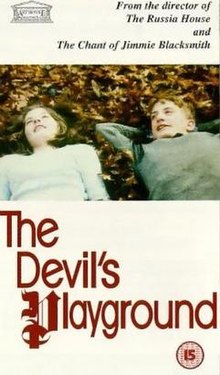The Devil's Playground (1976 film)
| The Devil's Playground | |
|---|---|
 Video cover | |
| Directed by | Fred Schepisi |
| Written by | Fred Schepisi |
| Produced by | Fred Schepisi |
| Starring | |
| Cinematography | Ian Baker |
| Edited by | Brian Kavanagh |
| Music by | Bruce Smeaton |
Production company | The Film House |
| Distributed by |
|
Release date |
|
Running time | 107 minutes |
| Country | Australia |
| Language | English |
| Budget | A$306,000[1] |
| Box office | A$334,000 (Australia) |
The Devil's Playground is a 1976 Australian drama film written, produced and directed by Fred Schepisi. It is a semi-autobiographical film which tells the story of a boy growing up and going to school in a Catholic juniorate administered by De La Salle Brothers. Its focus is on the trials of the flesh and the tensions that arise, for both Brothers and students, from the religious injunction to control one's sexuality.
Premise
In August 1953, the 13-year-old Tom Allen attends a Catholic juniorate in Melbourne, Australia. Students and Brothers face individual challenges of faith and self-restraint.
Cast
- Arthur Dignam as Brother Francine
- Nick Tate as Brother Victor
- Simon Burke as Tom Allen
- Charles McCallum as Brother Sebastian
- John Frawley as Brother Celian
- Jonathan Hardy as Brother Arnold
- Gerry Duggan as Father Hanrahan
- Peter Cox as Brother James
- Thomas Keneally as Father Marshall
- Sheila Florance as Mrs Sullivan
- John Diedrich as Fitz
- Alan Cinis as Waite
- Richard Morgan as Smith
- Jeremy Kewley as Thompson
Production
The screenplay was based on Schepisi's own experience attending a Catholic juniorate and took him five years to write.[2] The film financing took three years to arrange,[3] eventually coming from the Australian Film Commission ($100,000) and the Film House, Schepisi's own company ($154,000), with the balance coming from private investment.[4]
It was shot in 1975 mostly at Werribee Park near Melbourne.[1]
Recognition
The film won the 1976 Australian Film Institute Award for Best Film,[5][6] Best Direction,[7] Best Lead Actor for both Simon Burke and Nick Tate, Best Screenplay, Best Achievement in Cinematography, and the Jury Prize.[5]
Box office
The Devil's Playground grossed $334,000 at the box office in Australia,[8] which is equivalent to $2,157,500 in 2020 dollars. According to Schepisi, the movie almost got its money back.[4]
Home media
The Devil's Playground was released on DVD with a new print by Umbrella Entertainment in November 2008. The DVD is compatible with all region codes and includes special features such as the theatrical trailer, an interview with Fred Schepisi, and audio commentary with Fred Schepisi.[9] This film was released on Blu-ray by Umbrella Entertainment in June 2014, with extras.
See also
References
- ^ a b Pike, Andrew; Cooper, Ross (1998). Australian Film 1900–1977: A Guide to Feature Film Production, Melbourne: Oxford University Press, p. 303.
- ^ Malone, Peter (22 December 1998). "Fred Schepisi". Signis (interview). Archived from the original on 9 July 2019. Retrieved 22 December 2013.
- ^ Stratton, David (1980). The Last New Wave: The Australian Film Revival, Angus & Robertson. p. 134.
- ^ a b Stratton, pp. 131–132
- ^ a b "AFI Award Winners Feature Categories 1958–2009". Australian Film Institute Awards. Australian Film Institute. Retrieved 13 December 2013.
- ^ French, Lisa; Poole, Mark (2009). Shining a Light: 50 Years of the Australian Film Institute. Australian Teachers of Media. p. 165. ISBN 978-1-876467-20-3.
- ^ "Past Winners". AFI.org.au. Archived from the original on 21 July 2008.
- ^ "Film Victoria – Australian Films at the Australian Box Office" (PDF). Film Victoria. 27 September 2010. Archived from the original (PDF) on 12 March 2011.
- ^ "Umbrella Entertainment – Devil's Playground, The". Retrieved 8 May 2013.
External links
- 1976 films
- 1970s biographical drama films
- 1970s English-language films
- Australian biographical drama films
- Films directed by Fred Schepisi
- Films scored by Bruce Smeaton
- Films about Catholicism
- Films set in Melbourne
- 1976 directorial debut films
- 1976 drama films
- Films about puberty
- Films set in 1953
- 1970s coming-of-age drama films
